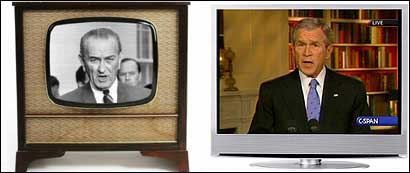Two wars, two presidents, two eerily similar predicaments. What George W. Bush might learn from Lyndon Johnson.

For three years beginning in March 1965, Johnson expanded US involvement in Vietnam, first with a bombing campaign and then with a half-million ground forces. During these months, Johnson went from one anguished moment to the next -- never letting on in public what White House tapes and documents now demonstrate, namely his horror at the loss of American lives and fear that he was locked in a failed war that was destroying his capacity to lead the country toward his cherished Great Society. In nationally televised speeches, Johnson hid his private doubts from public view, urging continued public backing for what he called an unwelcome but necessary conflict to assure both South Vietnam's autonomy and international peace.
It took until March 1968 for Johnson to fully accept that he could not continue the war. In August 1967, a front-page story by R.W. Apple Jr. in The New York Times described the war as deadlocked. That was followed by Defense Secretary Robert McNamara's private confession of failure in the fall of 1967, the Communist Tet Offensive at the beginning of 1968 -- which gave the lie to Johnson's predictions of victory -- and the confirmation by CBS News anchor Walter Cronkite that we are "mired in stalemate." Finally, on March 31, 1968, in a televised address from the Oval Office, Johnson announced a unilateral reduction in the US bombing of North Vietnam, an offer to begin peace talks with Hanoi, and his decision not to run again for president.
As internal records now show, however, Johnson's public statements during this time were aimed as much at bolstering American resolve to fight as at reaching agreement with the Communists. And Richard Nixon spent four additional years between 1969 and 1973 in a fight-and-negotiate strategy before declaring that peace was at hand -- a fig leaf for US--South Vietnamese defeat in America's longest war.
We now know a great deal about the inner workings of Johnson's decision-making on Vietnam, and we will surely learn a lot more in the future about Bush's struggle to come to terms with his ill-conceived efforts in Iraq. In the meantime, however, it is not too difficult to imagine that much of what Johnson and then Nixon struggled with in trying to find an acceptable way out of Vietnam is repeating itself in Bush's White House. Johnson and then Nixon were infuriated by their inability to bend either their allies in South Vietnam or the Communists in the North to their will. Decades from now, when we learn more about Bush's deliberations on how to "win" in Iraq, we are likely to see evidence of the same kind of frustrations with Iraq's Shiite-led government and Sunni insurgents.
An equally disturbing, and more evident, parallel is the conviction shared by Johnson and Nixon that losing the war in Vietnam would be disastrous for America's national security. Johnson and Nixon feared that a defeat in Vietnam would wreak havoc on US strategic interests and destroy American credibility: allies would no longer trust our promises to defend them and enemies would see us as a paper tiger. If we failed to bring a small war to a satisfactory conclusion, it would likely increase the danger of a larger nuclear war. At a minimum, as Nixon and Henry Kissinger came to believe, there had to be something resembling "peace with honor."
Likewise, Bush and his most outspoken supporters of a troop "surge," or escalation, and a continued pursuit of "victory," forecast a more dangerous world should the United States fail in Iraq: Our friends in Saudi Arabia and Egypt will lose confidence in our resolve to support them, and Al Qaeda will turn Iraq into a terrorist base from which they will launch attacks not only against America's friends in the Middle East and Europe but also against the homeland. In short, the war in Iraq is nothing less than a defense of America's people and cities.
article:
http://www.boston.com/news/globe/ideas/articles/2007/01/14/wars_and_men/?p1=MEWell_Pos5Bush Regime Running Scared . . .
http://www.democraticunderground.com/discuss/duboard.php?az=show_mesg&forum=364&topic_id=3123700&mesg_id=3123700http://journals.democraticunderground.com/bigtree